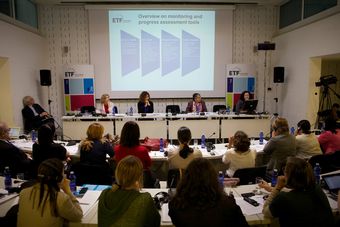The Inclusive PolicyNet working group on Vocational Education and Training (VET) identified policy recommendations
INCLUSIVE EDUCATION PROVIDES JOBS
„Attractive Vocational Education and Training (VET) “is inclusive VET. Young people do not choose to engage in vocational education to be socially included - they engage to get a job and to remain in the labour market!“, pointed out Ms Elizabeth Watters from European Training Foundation at the meeting of the Inclusive PolicyNet working group on Vocational Education and Training.
Children should choose their future professions based on their abilities, needs and interests carefully blended with the market needs. Accordingly, the Inclusive PolicyNet working group recommended developing policy and practice that systematically foster a climate favourable to children to choose, to provide them career development, professional orientation and selection, a lot earlier. Community, especially parents, need to take more constructive and realistic part in the school and vice versa.
To prepare young professionals for regional labour market,it takes updating and aligning VET curricula across South East Europe. While, for VET that responds to market needs, school boards and employment offices need to increase collaboration at all levels. Policy makers and authorities should be focused constantly on monitoring of implementation of cross-sectorial cooperation. There is continuous need to promote a common and wide understanding of what inclusive education really is.
These are recommendations for reforming inclusive practices in the Vocational Education and Training (VET) across South East Europe.
Based on research results and experiences of SchoolNet and TeacherNet, the Inclusive PolicyNet working group also recognised the important role of a principles and a need for constant professionalization of this function. But they considered that teachers, too, need training in the inclusive education practices.
The thematic policy meeting of the Regional Inclusive PolicyNet took place at the headquarters of the European Training Foundation (ETF) in Turin, Italy on the 16th & 17th June 2014. It included members from 7 Beneficiaries of the Joint EU/CoE Project “Regional Support for Inclusive Education” in South East Europe.
You can download here presentations:
- Analysis of focus group reports, Lana Jurko - NEPC
- Two Studies on VET and Social Inclusion, Will Bartlett, LSE and Niccolo Durazzi, LSE Enterprise
- The profile of NEETs in ETF Partner Countries, Martiño Rubal, ETF
- Attractive VET is inclusive VET, Elizabeth Watters, ETF
- Torino Process 2014, Evgenia Petkova, ETF
- HRD monitoring and assessment tools and their relevance for linking up national progress to European benchmarks, Cristina Mereuta, ETF
- VET policies and practices for social inclusion
Sidita Dibra, University of Tirana, Albania - Regional Support for inclusive education Policy Net Bosnia and Herzegovina
Nina Branković - The Status of Inclusive Education in Croatian VET schools. Based on the results of baseline study „Regional Support for Inclusive Education
Zrinka Ristic Dedic - Research Findings Montenegro
Milika Mirkovic - Country specific findings-Serbia
Dr Iskra Maksimovic and Ana Vjetrov, Faculty of Economy, Finance and Administration - VET Education Policies and Practices for Social Inclusion and Social Cohesion – Macedonia and Baseline survey on inclusive policies and practices - Macedonia
Dr. Nikica Mojsoska Blazevski, University American College-Skopje - Social inclusion in VET schools in Kosovo Arjeta Gashi

Interviews
LIDA KITA INTERVIEW
Lida Kita works as an operational officer at the European Training Foundation. She has two roles – she is country manager for Turkey & Israel and is a specialist in inclusion in education and training for the Western Balkans and Turkey. She is also on the Project’s steering board.
Her team was asked by DG Enlargement to mobilise the discussions in Western Balkans and Turkey to talk about social inclusion in education and training and her team designed the project. As a result she was asked to be a Steering Board member.
Ms Kita explains that a large amount of preparatory work was involved, so that, when the project was launched, it felt almost like bringing a child into the world.
Lida Kita said she was really enthusiastic about the project and what it was doing
Lida Kita of the European Training Foundation talking to David Addis
upcoming events
1st Meeting of the TeacherNet working group, Pristina, Kosovo*, 18 November 2014









